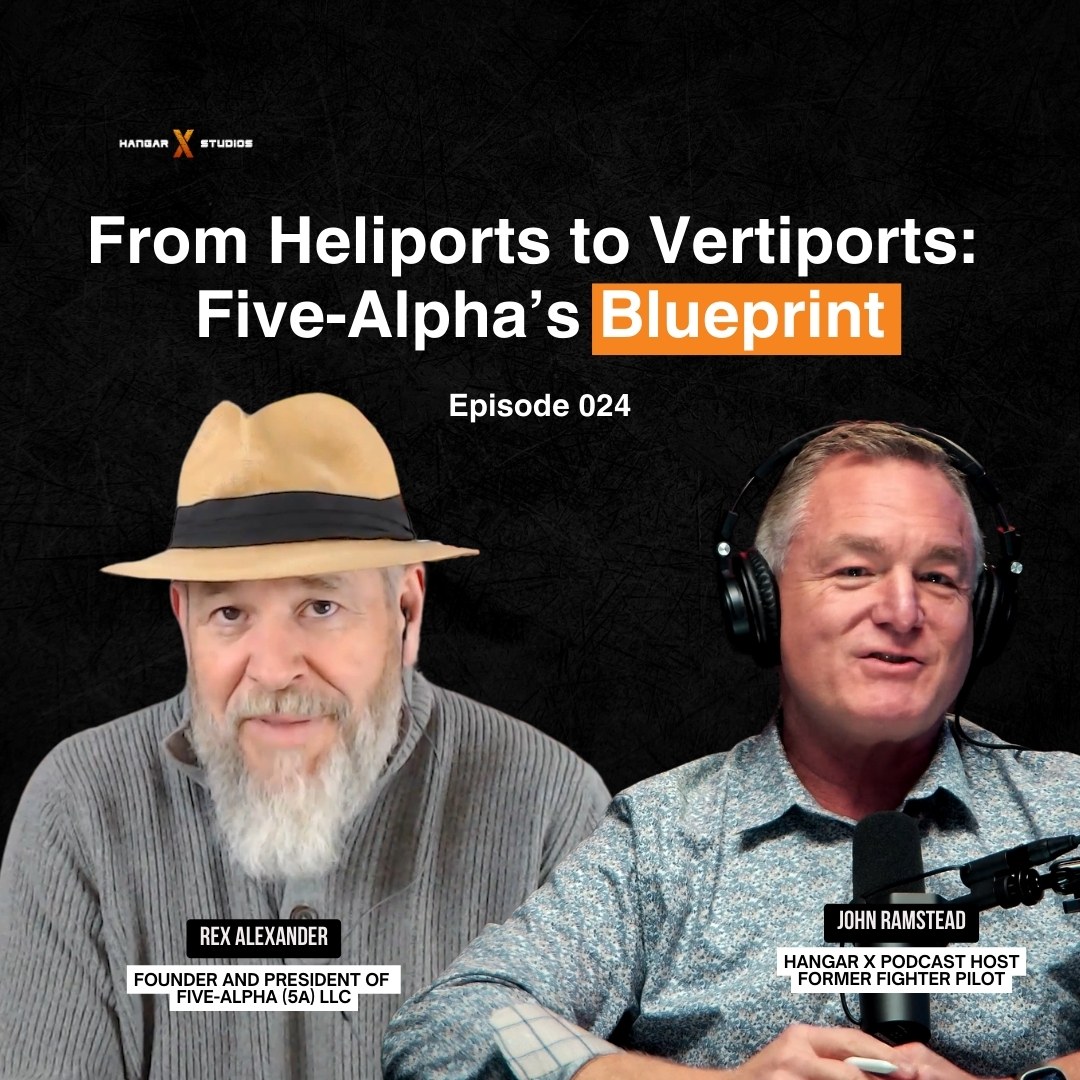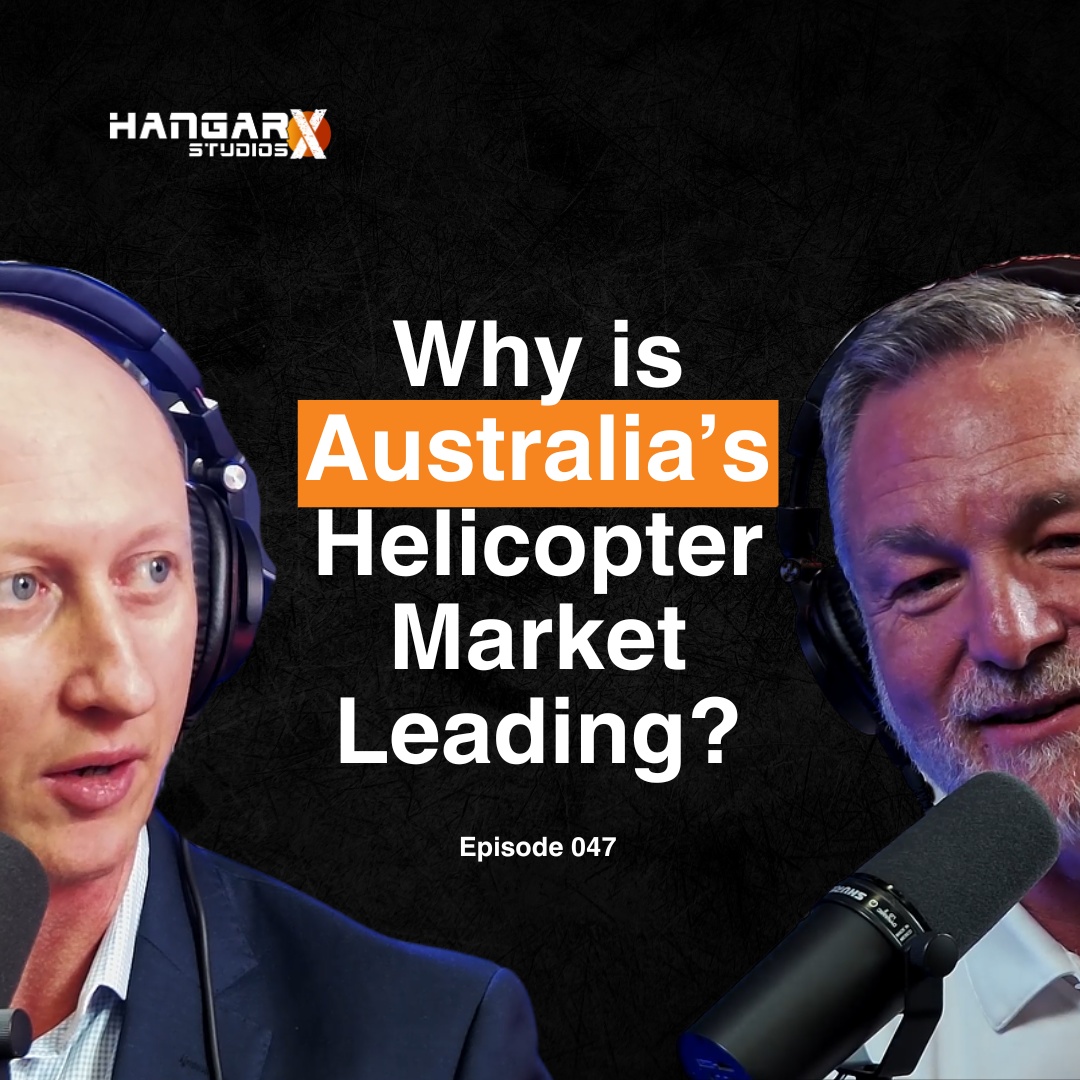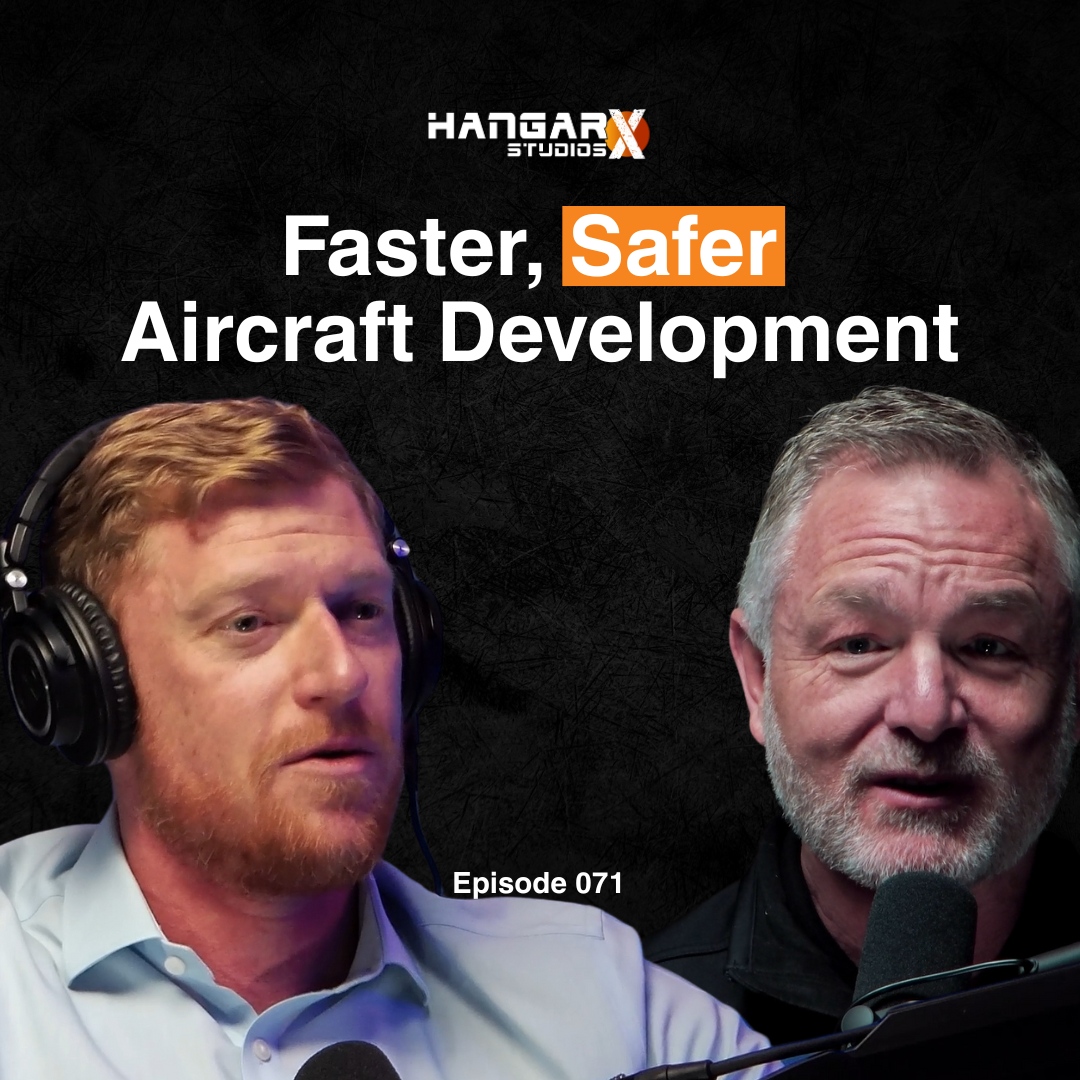Episode Transcript
[00:00:00] Speaker A: These kinds of innovations, these kinds of transformational leaps are much needed in aviation and are going to make life much more efficient going forward.
[00:00:11] Speaker B: Welcome to Hangar X Studios, where former fighter pilot and host John Ramsted takes us on a journey across aerospace as it enters an historic period of innovation and transformation.
Our guests include aviation experts, pilots, financiers, military leaders, and innovators of all types.
Buckle up for another episode of Hanger X.
Hey, welcome to the Hanger X podcast, where we talk about the future of not only aerospace, but aerospace innovation. And you're going to be hearing some of the most fascinating guests just from their backgrounds, their history, people that are innovators, people that are developing new technology and new uses for aerospace. And today, I'm really excited to have Michael Tap on the show. He recently joined and is the head of the advisory board for XTI Aerospace. So, Michael, welcome to our podcast.
[00:01:06] Speaker A: Thank you, John. I'm so glad to be here.
[00:01:08] Speaker B: And I loved hearing a little bit about your story before we got started. And we were sitting there chatting about your interest in aviation. Started a long time ago. Could you kind of weave that in your interest in aviation and a little bit about your business career?
[00:01:22] Speaker A: Well, I think humans in general are fascinated by aviation.
And as a young kid, I was always fascinated by flying. I absolutely remember my first commercial flight when our family took a trip to Disneyland and was the first time I'd ever been on an airplane. And I remember that day and have just been fascinated by flying since then.
Even in high school, I thought, what am I going to do as a career, as a profession? You know, is aviation going to ever be part of that? I actually started my undergraduate degree in aerospace engineering because I thought, well, those guys get to fly, right? Like, that'll be fun. I'm going to do something in that space. It didn't take long to figure out that the aerospace engineers do not fly. They build the birds.
[00:02:07] Speaker B: Yeah, they build the birds, and other people get to fly them.
[00:02:09] Speaker A: That's exactly right. So I was like, hey, wait a second. No, no, I want to fly. So I ended up changing my major and finishing an engineering degree and moving on into other things. But then early in my career, I actually had the opportunity to start a pilot's private pilots license. And like so many people who start, you're always torn between the time and the money to do it. And life got busy and I ultimately didn't finish it. But just the thought of aviation and certainly private aviation and the innovation in the industry.
[00:02:37] Speaker B: But here's the real question. Did you ever get to land an airplane solo?
[00:02:41] Speaker A: No.
[00:02:42] Speaker B: Okay. But you did land.
[00:02:44] Speaker A: I did land.
[00:02:44] Speaker B: Okay. If landings equal takeoffs, you know what? You're in a good place.
[00:02:47] Speaker A: Yes. That's good.
[00:02:48] Speaker B: Yep.
[00:02:49] Speaker A: Still sitting here.
[00:02:50] Speaker B: Yep.
[00:02:51] Speaker A: So.
So, at the end of the day, I think, you know, being involved in innovation, the aviation industry has gone through a lot of innovations over time, but it's been a while since anything's been truly transformative, at least on the fixed wing side. So that's one of the reasons why I think XTI is so fascinating in what they're trying to accomplish.
[00:03:10] Speaker B: So, joining the XTI, the advisory board, you're looking at the space of this crossover, vertical takeoff and landing, as it's really just emerging right now. What are some of the things that got you most excited about being part of aerospace right now and what's happening?
[00:03:27] Speaker A: Well, I think in the industry right now, there's just a lot going on with the air taxi takeoff and the whole new category being developed. I think what's super interesting about XTI is they're really blending the best of a rotorcraft scenario with fixed wing and creating, really, a new air type that can truly transform regional aviation. Not just short distances, but regional aviation.
[00:03:58] Speaker B: A hallmark of, one of the things that is really important to you is, first of all, developing deep relationships, and that's how you've always led right through venture capital and many other things that you've done that have led you to this point in your career. But the other thing that you are passionate about is also innovation. When you think about innovation and aerospace today, what are you seeing? If we're almost looking ten years out, why is innovation so important today? When you actually think of the industry, which for the most part has been kind of static, there's been some improvements and maybe engines and some avionics, but there's not been an entirely new airframe or an entirely new category of aircraft developed in 40, 50 years.
[00:04:43] Speaker A: It's fascinating, I think, you know, just as our society develops, population grows, our need for infrastructure and our need for mobility continues to increase. And the way that we've been able to do it historically has worked. But I don't know that it is going to be as efficient as we need in the future. And so I think these kinds of innovations, these kinds of transformational leaps are much needed in aviation and are going to make life much more efficient going forward.
[00:05:12] Speaker B: So here's the thought I have, just as we're looking at what's driving innovation right now, first of all, we're looking at our population has grown. There's such a density of population. We're looking at our transportation system, which is linked to our roads and our traditional airways right now. And it is. It's maxed out. We were just talking to a friend of ours, and when you're driving in LA, it's not about how much distance it is. It could be 8 miles. Nobody, nobody knows the distance. It's like, no, that's either two to 4 hours, depending on the time of day you leave. It's getting worse and worse. And if you look at knowable, it's unknowable is what he said, and the time. And we look at like we just had a hurricane, and we look at from disaster recovery to life flight to military, to just transportation in urban environments, to even just getting cargo where it needs to be outside of urban environments.
There's so much change happening right now, and I think some of the best thinkers in the world are trying to solve a lot of problems, and I think it's driving a lot of the innovation. And a big part of that, I think, is going to be the airspace around us and how we even not only communicate, but how we get from a to b or get products or people or help assistance from a to b. Michael, right now, where we're at in the present, there is so much innovation happening in really every area of life.
And I'm seeing it now in aerospace more than I've personally ever seen it. What do you think is driving that right now?
[00:06:42] Speaker A: Well, it's a great question. I think, number one, the population density and the growth that we're experiencing urban areas are continuing to sprawl our infrastructure, and its ability to handle that is just getting challenged in traditional forms.
I think more and more people would like to be further away from some of the density, but there's this trade off, right? The commercial value is in urban centers, but maybe my lifestyle value is pushing me further away. So how do I balance that? And right now I'm stuck with traditional forms. So I think the innovation is being driven by that. That's the demand side. And then also the technology and the advancements in technology and materials and the things that we can do have dramatically grown and are continuing to grow at an exponential rate. And so when you find the convergence of those things, I think it's bleeding into many industries, particularly aerospace and aviation, where the things that we can do now are more than we've ever been able to do in the past, and the benefits of doing them to meet the demands in the market are now undeniable.
[00:07:51] Speaker B: Yeah, I'm just thinking of some of those drivers, right, from power plants to what airframes are made out of to flight control systems to all these enabling technologies have actually allowed big thinkers engineers to actually say, you know what? If we put all this together, we could solve this problem.
[00:08:11] Speaker A: Right.
[00:08:11] Speaker B: So question for you then. This whole space VTOL, which is taking off, that XTi is a part of, and there's a whole bunch of different categories within there. XTI is much longer range, fast, you know, 300 knots and 700 miles range versus some of the small, you know, urban, you know, move things around, packages, delivery, cargo. But what is the problem that's being solved with this innovation, let's say, over the next five years?
[00:08:39] Speaker A: Well, I think it probably depends on the market and the application that you're going after. Certainly in the private aviation world, it's time and convenience. The ability to avoid an fBo, shorten the time it takes to get from point a to point b, because you can go point to point. And I think that's going to be a critical driver in that segment. Certainly in the medical transport segment, it's the value of the golden hour and the ability to extend that from a range standpoint and shorten the time to get from point a to point b and then being able to get you where you need to go, not just where you can go, which are the constraints of range. So in a helicopter situation, it's constrained by range.
[00:09:21] Speaker B: And so in speed.
[00:09:22] Speaker A: Yes, range and speed. And so you may get transported to the nearest hospital, but not where you really need to go. And so, you know, the Trifan allows the dramatic extension of that golden hour window such that we can get you to the place where you actually need to be. So I think those are two examples. Obviously, there's going to be some military examples down the road as well, where the trifen could be very instrumental in unique situations.
[00:09:51] Speaker B: Yeah, yeah. We could probably do a whole podcast episode just on use cases. And I, as you think of this industry, and I'm looking ahead because this is all about solving problems, you innovate, because what's happening, what you're doing now, is not working.
As you look five and ten years out in the development of the Trifan and other technologies, what are some of you think the biggest challenges that the industry and some of these companies are going to have to overcome to bring this to market and make it a reality?
[00:10:23] Speaker A: That's a great question.
Number one, I think it takes a lot of capital to pull these things off. So having access to capital and the confidence to do that over a long period of time is critical.
Also, I would say these are creating new categories from a regulatory standpoint and they're pushing into problems that haven't been solved, that have never needed to be solved.
The air taxi world, we've never had to deal with lanes in the sky in an urban setting that are highly congested.
[00:10:59] Speaker B: Right. Airspace controlling people coming in and out of telepath. Yeah. ATC is currently not set up to handle what needs to happen.
[00:11:08] Speaker A: That's right.
[00:11:09] Speaker B: So there's going to have to be a lot of collaboration and partnership across all the players and stakeholders in the entire industry.
[00:11:14] Speaker A: That's right. And infrastructure too. I think there's going to be some infrastructure pieces that are going to get, need to get built out.
[00:11:20] Speaker B: Yep.
Yeah. I'm also thinking one of the challenges to overcome too, is just the flight control systems, the engineering, the safety factors. I mean, this is a whole new aircraft. And I know some of the things we've been talking about, the inside conversations around that, is because it's such an absolute focus. But it's fascinating what's going to have to be developed in software, AI. Some of the tools that are out there right now is addressing this at a rate that has been really pleasantly surprising, actually.
[00:11:54] Speaker A: Right. And the great thing is the technology capabilities that we have today are allowing us to address those problems and put things together that can respond faster than a human can respond and create the level of safety that we all expect and want.
[00:12:09] Speaker B: So let's do this. As we wrap up here, I want to put on your futurist hat. Ten years out, if you could wave. Oh, let's just call it a realistic magic wand. And you're looking back ten years from this point, what is happening? What does the world look like from an aviation perspective ten years from now?
[00:12:29] Speaker A: Well, I think the ability to get from point to point will be common, as opposed to unique and special and rare and expensive.
[00:12:40] Speaker B: Right?
[00:12:41] Speaker A: That's right.
[00:12:41] Speaker B: Yeah.
[00:12:42] Speaker A: I think that's going to be one of the biggest things that we see change, and it's going to happen in multiple ways, multiple forms in that category.
[00:12:51] Speaker B: Interesting. Human life. I'm thinking about organ transplant, disaster recovery, military applications, personal transport, getting people from rural areas to hubs where they can actually get either services they need or get the transportation that they need. I mean, the list just goes on and on and on. And I think we're going to be looking up in the sky and it's going to be very different, isn't it?
[00:13:15] Speaker A: Some of the congestion that we see on the ground is going to be removed, which would be a good thing, and then put into the sky.
But the sky will definitely get more congested.
[00:13:24] Speaker B: It will. So as we wrap up, just any final thoughts or comments? You just joined the advisory board for XTI. I know you're excited about this company and the in the future where it goes and just love to know your final thoughts.
[00:13:37] Speaker A: Yeah, I think the advisory board for XTI, I'm super excited about that.
Over the course of my career, I really fundamentally value relationships and have sought to build deep and long term high trust relationships throughout my career. And that's really what an advisory board will be at XTI. It's going to be about relationships. And so I'm excited about the people that we're going to be able to bring to the table, not only their expertise and their knowledge, but also just the relationships in the community that gets built around that.
[00:14:13] Speaker B: Awesome. Michael, thank you so much for sharing. Thank you for taking the time. I love some of your insights. Love to have you back on, especially as things evolve and change and we keep innovating in this world and just really appreciate what you're doing leading the advisory board and your vision. So thanks for, thanks again. Mandez. Look forward to next conversation.
[00:14:32] Speaker A: Thank you, John. It's been a pleasure to be here.


